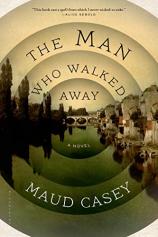The Man Who Walked Away
Review
The Man Who Walked Away
The setting for THE MAN WHO WALKED AWAY is the mental asylum at St. Andre in Bordeaux, France in 1886. It is a refuge for the patients who reside there, as they are treated with respect and dignity. The staff tries its best to keep things orderly, pleasant and under control, which is not always easy given the wide range of behaviors the patients exhibit. Psychiatry is still very much in its infancy. The patients suffer from illnesses/conditions that have neither actual names nor standard treatments. They live quiet lives and follow set schedules for meals and outdoor exercise. This structure gives them a sense of calm they all need.
One day, a new patient is brought to the asylum gates with a note attached to his waistcoat that reads "He is off his rocker." This stranger, named Albert, naturally causes a ripple of excitement and curiosity among the other patients. Marian believes the sun has stolen her stomach, Samuel wears an oversized coat no matter what the weather and fears everything, Rachel insists she has a frog in her stomach that tells her what piano music to play, and the veteran is jumpy and suspicious --- his mind is still back in the war.
"The overall feeling conveyed by author Maud Casey is one of compassion for these patients who are struggling to live as normal a life as their illnesses will allow them."
Albert is a walker who has journeyed far and wide in an almost trance-like state for several years. He has wandered across Europe and beyond. He wears holes in his shoes, which he cushions with soft moss to protect his feet. He has no map and no purpose for his journeys, just the dogged need/obsession to be moving forward on his feet night and day. He has been jailed and chased out of villages as an unwelcome vagrant. He has ended up in unfamiliar cities and walked along river banks of many rivers. And the long walks are both enchanting and exhausting.
When Albert finally stops walking, he's relieved that either his legs or his arms ache because he knows his body has not yet disappeared. He has bits and pieces of memories of living in a small cottage with his father. Possibly he remembers a friend named Baptiste with whom he might have served in the army and later deserted it. He is certain about very little. Whatever memories Albert makes during his random and obsessive journeys are recalled later as fuzzy impressions. It is as though he holds a handful of jigsaw puzzle pieces, but there is no picture on the box lid to help him assemble the puzzle of his life into something coherent and recognizable.
Albert is also a puzzle as well as a challenge to the kind Doctor who treats him. The study of mental health problems is quite new in the late 19th century, and very little is actually known about diagnosing and treating mental illness. The Doctor (he is never named in the book, but is capitalized) is very patient and a good listener. He tries to help Albert unearth memories, no easy task since Albert cannot not even recall his age. Their daily sessions are brief so that Albert can rest both his body and mind. The Doctor is not without his own quirks and obsessions. As he rattles through the village on his new bicycle that he loves, he calls out anatomical names by body system. He begins with the skeletal system and works outward. He often repeats his favorite word ("Lacrimal, lacrimal, lacrimal"). He also has bits of hazy memories that he is unable to place in context and becomes quite obsessed with solving the puzzle that is Albert.
THE MAN WHO WALKED AWAY is a most unusual book. Some parts of it have a fantasy-like quality of writing, especially the descriptions of Albert's trance-like walking. But the book is very realistic when describing the interactions between patients and the asylum staff. Although Albert's illness is the main plot, much emphasis is placed upon the Doctor, and the story often bounces back and forth between the two men. The overall feeling conveyed by author Maud Casey is one of compassion for these patients who are struggling to live as normal a life as their illnesses will allow them.
Reviewed by Carole Turner on March 21, 2014
The Man Who Walked Away
- Publication Date: December 30, 2014
- Genres: Fiction, Historical Fiction
- Paperback: 240 pages
- Publisher: Bloomsbury USA
- ISBN-10: 1620403137
- ISBN-13: 9781620403136





